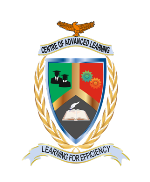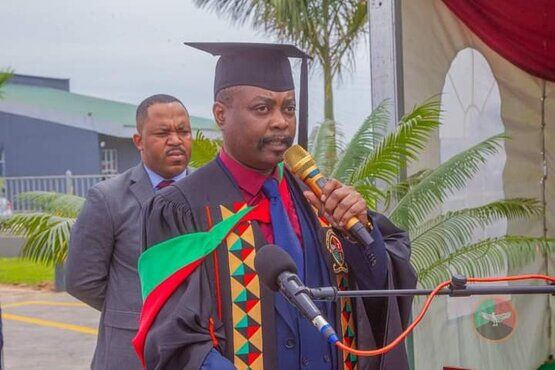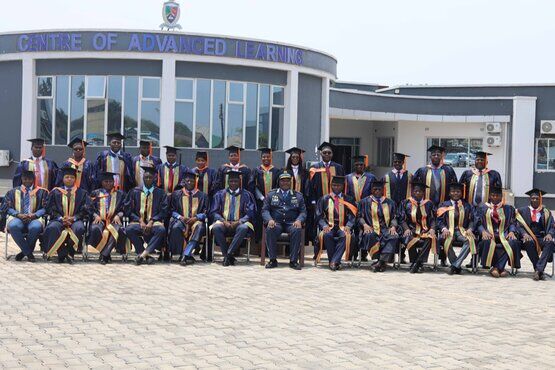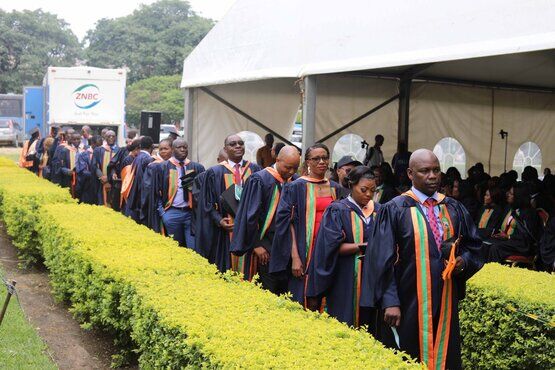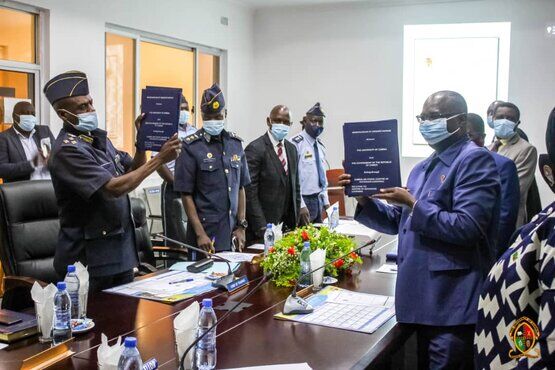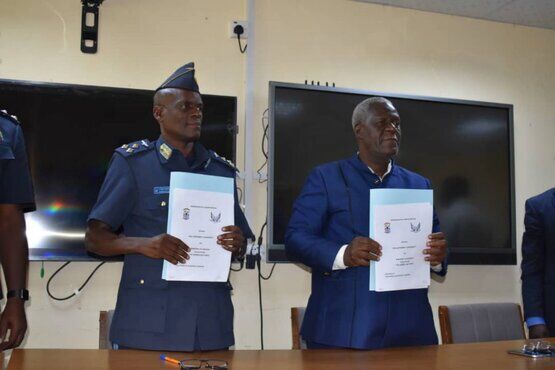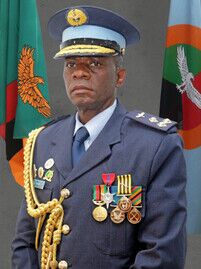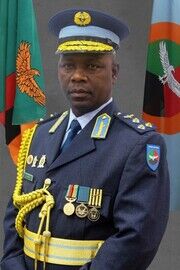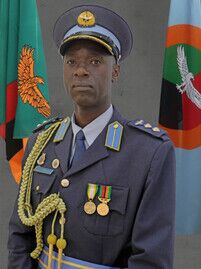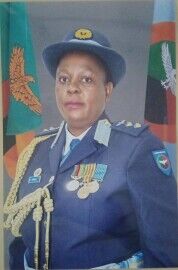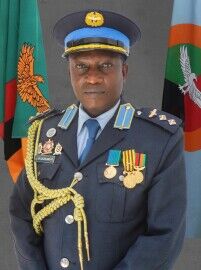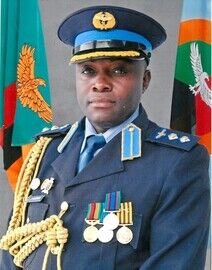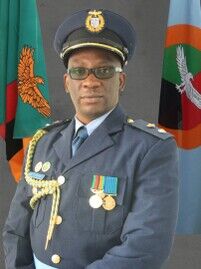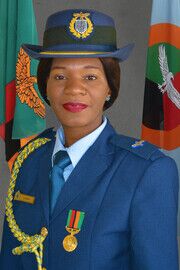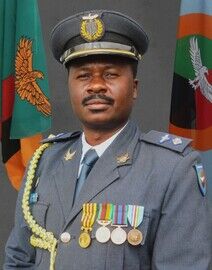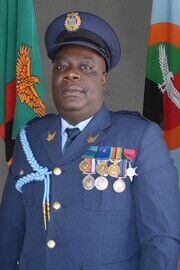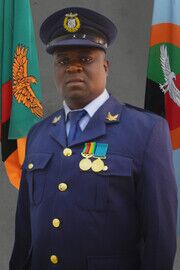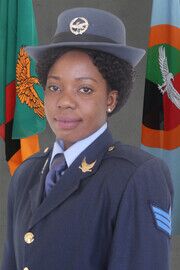The Zambia Air Force Commander
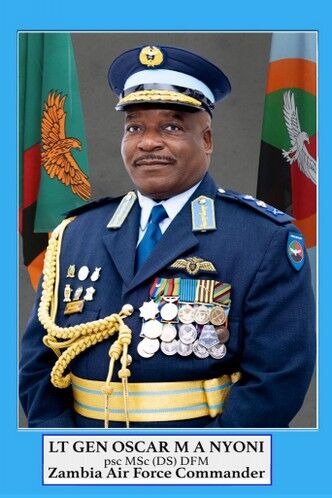
Lieutenant General Oscar Nyoni psc MSc (DS) DFM
WELCOME TO THE CENTER OF ADVANCED LEARNING (CAL)
My humble greetings to you all, it is important for me to inform you that the Airforce as a Military Establishment demands the Management of its Assets in a Highly Technical and Proficiency of Professions of its Human Capital. All Organizations need effective leaders to succeed and the Zambia Air Force is no exception.
In order to Serve the Republic of Zambia effectively and efficiently through our Constitutional Mandate to Defend and Support the Nation the Center of Advanced Learning (CAL) was envisioned as a Public Private Partnership initiative between Zambia Air Force (ZAF), Copperbelt University (CBU) and the National Institute for Public Administration (NIPA).
A Lecture given to a group of Servicemen at CAL is a cost effiecient & effective mode of transforming Careers through Education than to sponsoring a few who may learn in various outside Institutions.
A growing research literature has shown the multidimensional roles which Education plays in an Organisation's quest to meet their Strategic Goals. It is in this sphere of influence of operating in modern trends that this Institute offers to you various Academic Programmes through a state or art Center of Advanced Learning.
Education in any socio- economic domain is one of the fundamental factors of development. No Organisation can achieve sustainable economic development without substantial investment in human capital.
The establishment of the Center of Advanced Learning will enrich Service Personnel with understanding of themselves and their Profession in Zambia Air Force. It is to improve the quality of their Careers and lead to a broad of benefits of productivity and creativity in securing economic and social progress of our Nation Zambia.
May God Bless you all as you endeaver to progress in your careers and contribute to the Development of Our Nation Zambia, i thank you.
The Deputy Air Force Commander
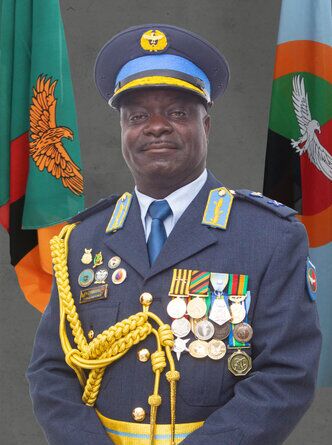
& Chief of Air Staff
Major General Henry Chiwaya psc, Dip DSS, QFI, ED, DFM
OUR STRATEGY
Through our partnership with the University of Zambia, Copperbelt University and National Institute of Public Administration, we aim to archieve Student Success through advanced student centered learning, chief among them is our quest to attain student’s motivation and commitment. These characteristics are intrinsic to our students, and are the essential learning traits which we engender through engaging Advanced Learning of a Courses of special interest to a student at the Centre of Advanced Learning (CAL).
At CAL, Professional Military Education (PME) is therefore designed to prepare professional militaries to deal with the ever increasing ambiguities and multi-layered contemporary security environment and battle space. A PME curriculum is aimed to be broad enough to provide new academic horizons and deep enough to whet the intellectual curiosity of all officers, airmen and airwomen. PME is a critical gateway to endow a nation’s armed force with the ability to live up to and to meet this awesome national security responsibility.
OUR VISION
Our Vision at the Center of Advanced Learning is "To develop excellence in the ability, skill and competence in accordance with the high standards of profession through advanced learning". This will enable us deliver our constitutional mandate to the people of Zambia more objectively through this initiative to build capacity in our Human Capital with value addition of quality in retention.
OUR MISSION
Our Mission at the Center of Advance Learning is "To keep the Air Force Operational and Safe by developing Profiecency and Profesion in the Service Personnel." This will be achieved by fostering productive work cultures where Service Personnel and Civillian Staff can serve our Nation professionally and diligently as they pursue and attain their academic goals."
Meet The Commandant CAL
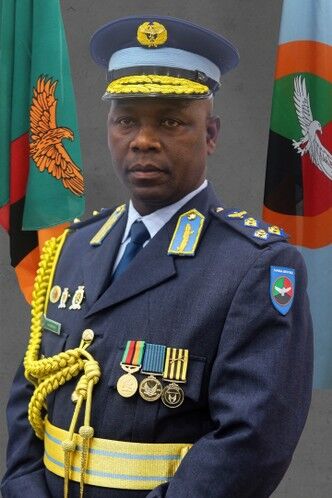
Brigadier General Malama Richard Bwalya
psc, Dip DSS, BA Econ, PGD TM, MA Econ, MZIHRM
the importance of Military studies
Military Studies is also known by various names like defence and strategic studies, military science, war and national security studies, war and strategic studies etc. Military Studies is currently taught only in a handful of colleges / universities. This raises two questions. One, what is the importance of Military studies? Two, why should Military Personnel including other Personnel Manning Civil Strategic National & Security Institutions/Assets study this subject?
As you would have studied in history, mankind always suffered from wars but never gave up the need to fight wars. In the modern world, the need to wage wars has changed and the methods of fighting too have changed. The Center of Advanced Learning (CAL) Military Wing offers this special issue of Defence Studies, we situate defence planning as a constitutive element of defence and strategic studies.
Indeed, in addition to the usual “downstream” focus on the use or non-use of force, on policy decision-making in foreign relations, military operations and global external engagement, we argue for the utility of an increased “upstream” focus on what is a major part of everyday defence and security policy practice for military, civilian administrative and political leadership: the forward-looking preparations for the armed forces and other capabilities of tomorrow. In this manner defence planning emerges as a “strategic fact” with dynamics of its own.
The importance of having strong armed forces and the need to protect the people against various threats is a constant feature of our life. Knowledge of military security, how armed forces are organised to fight a war and what is the art of warfare are questions, which get answered by studying military studies. By learning about the military, the Government and the armed forces the people become more awakened and can handle situations better. The military study helps the leaders to understand the importance of Armed Forces in defending our motherland.
Zambia Air Force - Center of Advanced Learning
PROFESSIONAL ACADEMIC PROGRAMMES AND CIVIL STUDIES
Lecturers at CAL serve in the role of guides, monitors, coaches, tutors and facilitators in order to support different learning styles for our students. At CAL, we understand that students must be involved in the development of learning goals.
“The central task of education”, according to Eric Hoffer, “is to implant a will and facility for learning; it should produce not learned but learning people.”1 Broadly interpreted, this conception of education implies that learning is contingent and continuous.
Learning is contingent in the sense that it depends on a permissive institutional structure and environment, and on individual disposition and desire. Learning is continuous in the sense that even though one may formally graduate from an educational institution, it is a life-long activity.
The necessity of education for armed forces personnel arises from their unique employment which includes, among other things, defense of the nation and provision and maintenance of peace and security abroad.
To be successful at these tasks, armed forces members need to be intellectually agile in order to out-think their adversary and to be able to work with allies and increasingly non-armed forces personnel. Additionally the necessity of education inheres in the need as Williamson Murray put it:
“to prepare [armed forces personnel] for missions across the full spectrum of conflict, ranging from deterrence at the high end to peace keeping and enforcement at the low end.”
